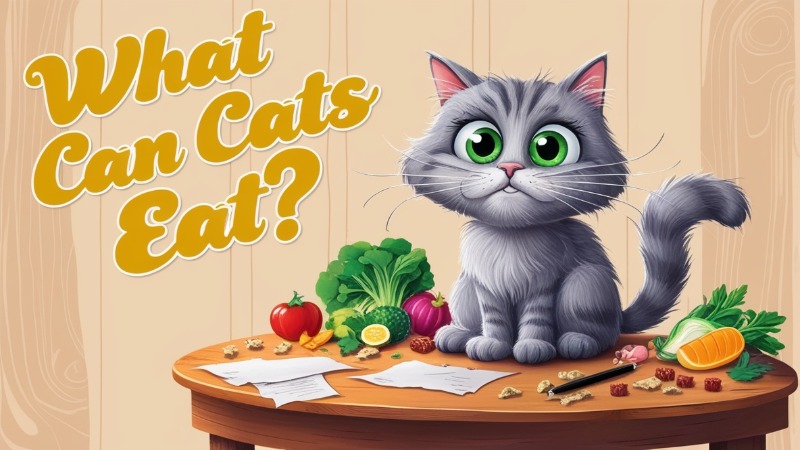Cats are adorable companions with their purring and playful antics. As obligate carnivores, they thrive on a diet primarily made up of meat. However, many cat owners wonder: what human food can cats eat from the fridge? This guide will help you understand which human foods are safe for your feline friend, as well as what should stay off their menu.
Table of Contents
- Everyday Foods Cats Can Eat
- Can Cats Eat Bread?
- Can Cats Eat Rice?
- Can Cats Eat Cheese?
- Can Cats Eat Eggs?
- Can Cats Eat Bananas?
- Safe and Unsafe Foods for Cats
- FAQs
Everyday Foods Cats Can Eat
When it comes to sharing food with your cat, moderation is key. Here are some human foods that are generally safe for cats:
- Cooked Meats: Chicken, turkey, and beef are excellent sources of protein. Make sure they are cooked without any seasoning or sauce. Lean cuts with no bones are best.
- Fish: Cooked fish like salmon or tuna (in moderation) can be a tasty treat. Avoid fish that is high in mercury or any raw fish.
- Vegetables: Some cats enjoy steamed broccoli, carrots, and peas. These can be a healthy addition but should not make up a large part of their diet.
- Fruits: Certain fruits like watermelon and cantaloupe can be safe options. Remove any seeds and give them in small amounts.
- Eggs: Cooked eggs (scrambled or boiled) are a good protein source. Avoid raw eggs due to the risk of bacteria.
For a more detailed list of safe human foods, check out Taste of the Wild’s article.
Can Cats Eat Bread?
Cats can eat bread in small amounts. Plain, white, or whole-grain bread is safe. However, bread offers no nutritional value for cats and should not be a regular part of their diet. It’s best to keep it as an occasional treat.
Can Cats Eat Rice?
Yes, cats can eat rice, especially if it’s cooked plain. Rice can be a good source of carbohydrates and may be helpful if your cat has an upset stomach. However, as with bread, it should not replace their regular diet of meat.
Can Cats Eat Cheese?
Cheese can be a fun treat for some cats, but not all cats can digest dairy well. If your cat enjoys cheese, offer it in small amounts and watch for any signs of digestive upset. Stick to plain, low-fat cheeses like mozzarella.
Can Cats Eat Eggs?
Yes! Cooked eggs are safe and nutritious for cats. They provide protein and various vitamins. Ensure the eggs are fully cooked and free from any seasoning or additives.
Can Cats Eat Bananas?
Cats can eat bananas in small amounts. While some cats may enjoy the taste, many might not be interested. Bananas are not harmful but should only be given occasionally due to their high sugar content.
Safe and Unsafe Foods for Cats
Safe Foods
- Cooked meats (chicken, turkey, beef)
- Fish (salmon, tuna, cooked)
- Eggs (cooked)
- Certain vegetables (steamed broccoli, peas)
- Fruits (watermelon, cantaloupe)
Unsafe Foods
- Onions and garlic: Can damage red blood cells and lead to anemia.
- Chocolate: Toxic and can cause serious health issues.
- Grapes and raisins: Can lead to kidney failure.
- Caffeinated drinks: Harmful to cats.
- Raw eggs and raw fish: Potentially harmful due to bacteria.
For a comprehensive understanding of what foods are safe and unsafe for cats, refer to this guide.
In conclusion, sharing food with your cat can be delightful, but it’s crucial to know what is safe. Cats require a diet rich in protein, so meat should always be their main focus. If you’re ever uncertain about a food’s safety, consult your veterinarian for guidance. Enjoy those cute moments with your feline friend, but remember they have their own unique dietary needs!
FAQs
Can my cat eat human food every day?
While some human foods are safe, they should not replace a balanced cat diet. Always consult with your vet before introducing new foods regularly.
What should I do if my cat eats something unsafe?
If you suspect your cat has eaten something toxic, contact your veterinarian immediately for advice.
Can I give my cat treats?
Yes, you can give your cat treats, but choose cat-specific treats or small amounts of safe human food.
Is it safe to feed my cat leftovers?
It depends on the leftovers. Avoid seasoned or processed foods. Plain meats or vegetables can be safe options.It depends on the leftovers. Avoid seasoned or processed foods. Plain meats or vegetables can be safe options.
